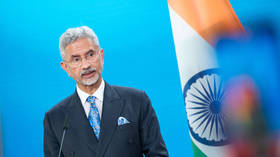India ‘operationally prepared’ until dispute with China resolved – army chief
General Dwivedi has described the situation at the border as “stable” but “not normal”
India will remain “operationally prepared” for any potential standoff with China despite the two neighbors making progress on border talks, New Delhi’s army chief, General Upendra Dwivedi, said on Tuesday.
Speaking at a military conference in the Indian capital, Dwivedi claimed that although the situation at the border appears “stable” at present, it is “not normal.” He added, however, that “positive signals” are emerging in diplomatic terms.
“When it comes to the on-ground situation, our corps commanders are the ones who make operational decisions,” he clarified. The army chief noted that an acceptable solution for New Delhi would be returning to the pre-April 2020 status of military deployments on both sides of the border.
In 2020, Indian and Chinese troops clashed in the contested Ladakh region, leading to casualties on both sides. More than 30 rounds of high-level diplomatic and military talks have been held in the ensuing years, without indication of any clear breakthrough.
Despite ongoing disengagement efforts, both sides have maintained a heightened state of alert, with troops and weaponry systems stationed 4,000 meters (over 13,000ft) above sea level, in extreme conditions, according to reports in the Indian media.
Last week, the Indian Express reported that India and China have made “significant progress” on resolving issues along their border in eastern Ladakh. According to the newspaper, Indian troops could soon regain access to certain patrol points along the contested border previously blocked by Chinese forces, or to buffer zones set up during disengagement efforts, after headway was made at a recent meeting in Beijing.
Indian Foreign Minister Subrahmanyam Jaishankar earlier stated that 75% of “disengagement” issues had been resolved with China, although there is “more to be done.” Speaking at an event in New York last week, Jaishankar noted that certain “patrolling issues” still need to be resolved.
According to latest report by the Observer Research Foundation think tank, this means that China “must completely back down and withdraw all its forces to their pre-April 2020 deployments or garrisons, restore patrolling rights for both sides and honor the 1993 and 1996 agreements.” These agreements permit both sides to conduct patrols along the Line of Actual Control (LAC), a 3,500-km (around 2,100-mile) poorly defined border in the Himalayas, “up to their perception” of what the demarcation is.
In case of disagreement, both sides are obliged to jointly work out a resolution. The agreements also limit both sides’ ability to conduct exercises, carry out air intrusions, fire weapons or explosives, and deploy large forces along the LAC. According to New Delhi, however, the latter was violated by Beijing in April-May 2020.
Earlier this year, Jaishankar also stressed that ironing out differences with both of India’s nuclear-armed neighbors, China and Pakistan, is high on Prime Minister Narendra Modi’s agenda after he was elected for a third term.
You can share this story on social media:








Comments are closed.